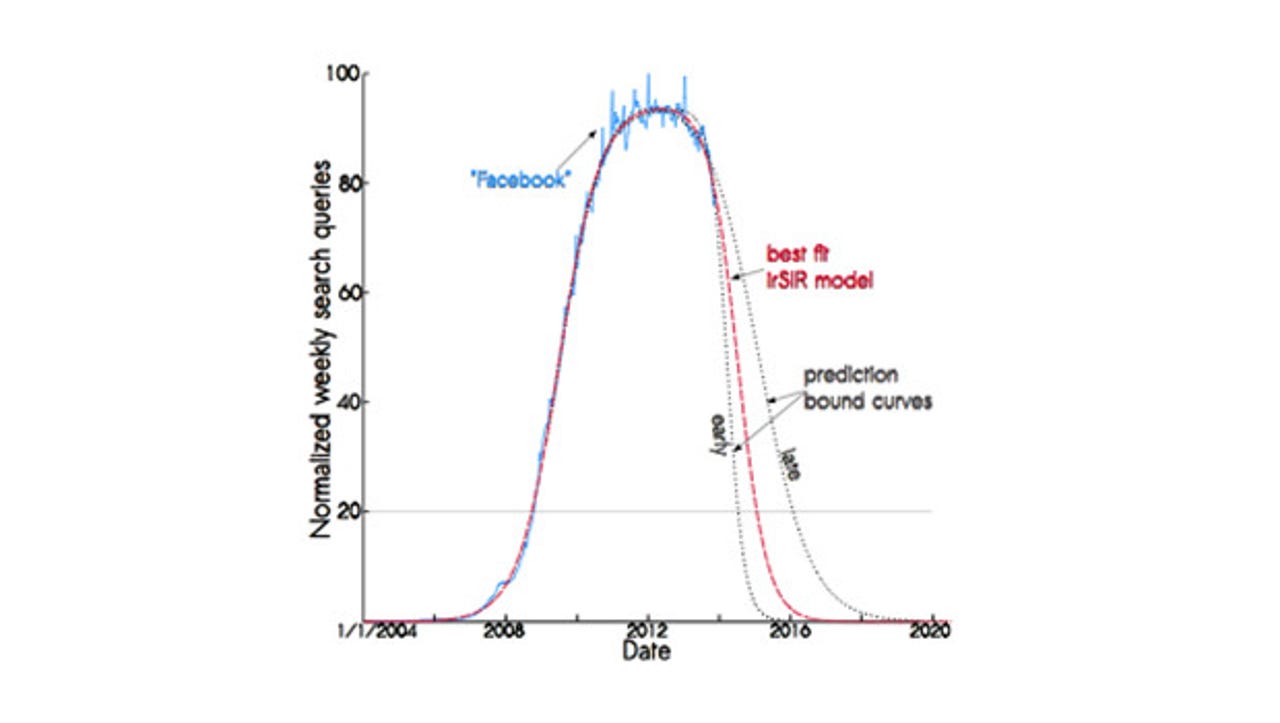Researchers say Facebook membership will drop 80 percent by 2017. Seriously?

No, this not an Onion story. A pair of Princeton University graduate students claim that by 2017 Facebook will have lost 80 percent of its active membership, thus killing it off for all practical purposes.
Don't start shorting your Facebook stock quite yet.

How can they make such a claim? The two explain, "We use epidemiological models to explain user adoption and abandonment of online social networks (OSNs), where adoption is analogous to infection and abandonment is analogous to recovery."
In English, they're treating the growth -- and decline -- of social networks as if they were diseases.
They continued:
"We modify the traditional [Susceptible-Infected-Recovered] SIR model of disease spread by incorporating infectious recovery dynamics such that contact between a recovered and infected member of the population is required for recovery. The proposed infectious recovery SIR model (irSIR model) is validated using publicly available Google search query data for 'MySpace' as a case study of an OSN that has exhibited both adoption and abandonment phases. The irSIR model is then applied to search query data for 'Facebook,' which is just beginning to show the onset of an abandonment phase. Extrapolating the best fit model into the future predicts a rapid decline in Facebook activity in the next few years."
My first reaction to this was "But how will grandma see the latest finger-painting masterpieces by little Calvin and Susie!?" Most of my ZDNet comrades also greeted this prediction with gales of hysterical laughter.
Then I thought about it some more. The SIR model is well-regarded because it does an excellent job of predicting how epidemics work in the real world and the model does fit the rise and fall of MySpace quite well.
Featured
Still, Facebook, with a billion plus monthly users, is bigger than any other social network. Is MySpace's failed model really a good reference model for Facebook?
On the other hand, at one time, AOL, Digg, and Alta Vista all looked like untouchable Internet giants.
That said, it should also be kept in mind that social phenomena are always hard to predict. If they were easy to predict, every advertising campaign would be a rip-roaring success. They're not.
In addition, a better model for Facebook adoption might be that of radio, TV or the Internet itself rather than MySpace. After all, both Google, with Google+, and Facebook are trying to be more than just a social network. They want to become the hub of all your Internet life.
I use Facebook myself, although I prefer Google+. I use it because that's where my high-school friends and relatives hang out. They can't tell the difference between the Web and the Internet.. and could care less. For them, Facebook is just easy and works. Indeed, for many of them Facebook has become their portal to the Internet... not that there's anything wrong with that.
The bottom line is that now that grandma and grandpa are on Facebook, I don't see them moving to another social network anytime soon. Facebook certainly isn't "cool" anymore, but stone-cold dead in three years? Nah, I don't think so. So long as there are old high-school buddies and aunt Flo who wants to share photos of her cat Mr. Nibbles, Facebook will do just fine.
Related Stories:
- Facebook takes another cue from Twitter with Trending
- Three words you won't see on Facebook, Google, Twitter ads: 'Wanna get high?'
- Money talks: Facebook acquires conversation platform provider Branch Media
- Facebook sued for allegedly scanning your private messages
- Facebook Wi-Fi lands in new Netgear routers for free small business Internet access